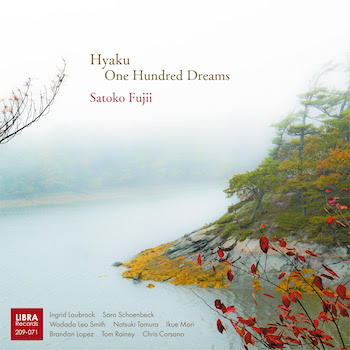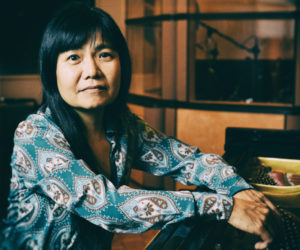Jazz Album Review: Satoko Fujii’s “Hyaku: One Hundred Dreams” — Slightly Restrained Mayhem
By Steve Feeney
Pianist/composer Satoko Fujii’s determination to create is astonishing and wide-ranging — her 100 albums as leader prove it.
Satoko Fujii — Hyaku: One Hundred Dreams (Libra Records)
 Who can doubt that the release of Satoko Fujii’s 100th album as a leader is a major achievement? But I phrased that in the form of a question because I suspect that someone may suggest that she might have hit that milestone a while back. The Japanese avant-garde pianist, composer, and bandleader is nothing if not amazingly prolific — she has put out swarms of albums, sometimes enough to fill the sky, since her 1996 debut.
Who can doubt that the release of Satoko Fujii’s 100th album as a leader is a major achievement? But I phrased that in the form of a question because I suspect that someone may suggest that she might have hit that milestone a while back. The Japanese avant-garde pianist, composer, and bandleader is nothing if not amazingly prolific — she has put out swarms of albums, sometimes enough to fill the sky, since her 1996 debut.
Fujii’s determination to create is astonishing and wide-ranging. For a start, there are the financial resources necessary to make so many recordings possible (a foundation grant apparently helped with this one). Then there are the physical demands and the calls for creative resilience. Remarkably, Fujii has forged ahead, one experimental effort following the other. One of her accomplishments, perhaps her most impressive, is that you overlook any of her albums at your peril. You are likely to miss out on something special.
Hyaku: One Hundred Dreams especially caught my interest for the personnel Fujii assembled for the disc. She has worked with most of these musicians before. But seeing, alongside this pianist/composer, a lineup this powerhouse — Ingrid Laubrock (tenor sax), Sara Schoenbeck (bassoon), Wadada Leo Smith (trumpet), Natsuki Tamura (trumpet), Ikue Mori (electronics), Brandon Lopez (bass), Tom Rainey (drums), and Chris Corsano (drums) — drew me in.
The variety of shimmering solos, sputtering interludes, and expressive outbursts on this release will be familiar to Fujii fans. But there is an effort at unity in this newly composed, five-part suite that is unusual: things come together divinely.
Part One begins as it should, with some stretched-out tinklings from the leader’s piano. Mori adds blips and blurps, sounding like an impatient robot. Drums and bass then serve up some expressive splashes and flourishes before Fujii kicks off a succession of dramatic rumblings and energetic wanderings across the keyboard. Schoenbeck’s bassoon adds a pensive elegance with occasionally expressive outbursts. Music worthy of a chamber music concert threatens to break out before the ensemble briefly moves into a dialogue (keyed by a drum duet) that generates the sort of slightly restrained mayhem that is characteristic of the finest moments on this release.

Pianist and composer Satoko Fuji. Photo: Byran Murray
Part Two gives trumpet master Smith a chance to make his musical mark via various colors, shapes, and forms, played solo and against a textured background provided by the anarchistic collective. A listener’s patience will be rewarded in this carefully crafted — yet still seemingly spontaneous — section of the suite.
Part Three is when I finally became fully drawn into the proceedings. Laubrock’s tenor becomes marvelously skitterish as it attempts to rise above the rumbling/tumbling drummers and a building bass line. Trumpets push themselves forward until things get really crazy — odd electronic textures summon an arco bass and bassoon rumination. A trumpet pas de deux and an episode featuring a fluttering bassoon characterize a piece that, while free, churns up enough interwoven variety to renew one’s faith in ensemble cohesion.
Part Four continues in a more contrapuntal mode before Mori goes all space age, the album’s universe of sound expanding to the outer reaches, a planet where Tamura’s rogue trumpet whispers and snarls above a bit of wacky vocalise.
Part Five is a compellingly mysterioso jaunt through sonic caverns before the leader gathers everyone in (including the horns) for some surprising interludes of consonance amid the ever looming chaos. Trumpets gurgle and chirp — the tenor sax answers with querulous growls. A collective rant ensues that leads to a too-quick fade out.
My only quibble with this impressive disc is that there’s not enough piano! But I’m pretty sure the next 100 releases from Satoko Fujii will make up for its absence.
Steve Feeney is a Maine native and attended schools in Maine, New Hampshire, and Massachusetts. He has a Master of Arts Degree in American and New England Studies from the University of Southern Maine. He began reviewing music on a freelance basis for the Portland Press Herald/Maine Sunday Telegram in 1995. He was later asked to also review theater and dance. Recently, he has added BroadwayWorld.com as an outlet and is pleased to now contribute to Arts Fuse.
